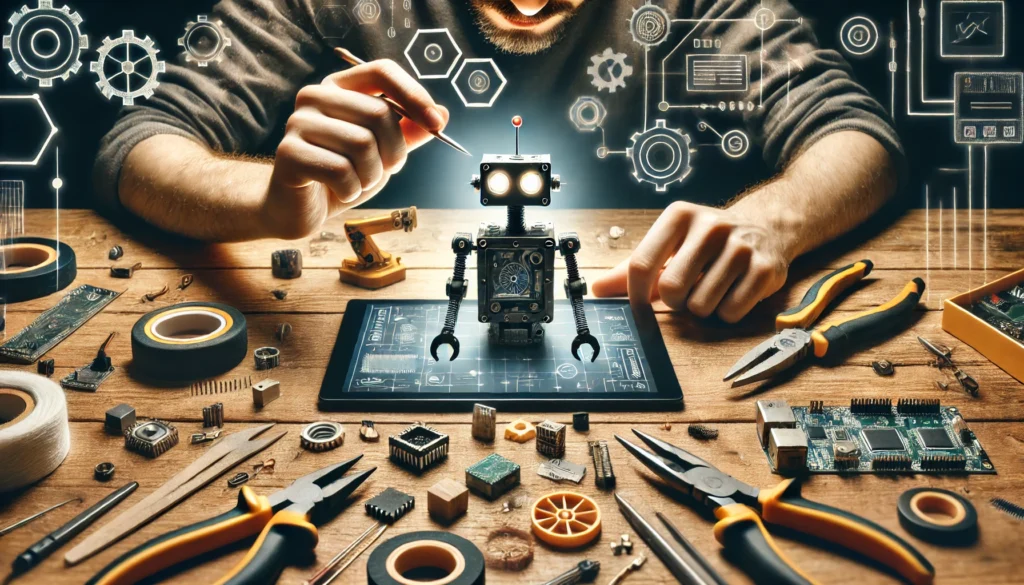In this article, we’ll explore essential tips for mastering new skills, weaving historical context, current trends, and future implications to provide a comprehensive understanding of skill development.
You may also like: Essential Daily Habits for a Productive Life
Understanding the Science of Learning
Learning is a complex process that involves the brain’s ability to create and strengthen neural connections. The science of learning has evolved significantly over the years, providing insights into how we can optimize our ability to acquire new skills. Key concepts include neuroplasticity, the brain’s ability to reorganize itself by forming new neural connections, and the importance of repetition and practice in solidifying these connections.
The Role of Neuroplasticity
Neuroplasticity is the brain’s remarkable ability to adapt and change throughout life. This concept has revolutionized our understanding of learning and skill development. By engaging in activities that challenge the brain, such as learning a new language or playing a musical instrument, we can enhance neuroplasticity and improve our cognitive abilities.
Neuroplasticity allows the brain to recover from injuries and adapt to new situations. This ability to rewire itself means that learning new skills can continue well into old age, challenging the outdated notion that learning is only for the young. Moreover, neuroplasticity supports emotional and psychological resilience, as it enables the brain to adapt to changes in the environment and personal circumstances.
The implications of neuroplasticity extend to personalized education and therapy. As we understand more about how individual brains adapt and learn, we can tailor learning experiences to optimize each person’s unique neural architecture. This could revolutionize how we approach education, making it more inclusive and effective for diverse learning needs.
Repetition and Practice
Repetition is a fundamental component of skill mastery. The more we practice a new skill, the stronger the neural connections become, making the skill easier to perform over time. This principle is often referred to as “muscle memory,” although it applies to cognitive skills as well.
Repetition not only strengthens neural pathways but also enhances confidence and reduces performance anxiety. As skills become more automatic, individuals can perform them with greater ease and less conscious effort. This automaticity is crucial for complex tasks that require multitasking or high levels of concentration.
Effective repetition involves variation and challenge to prevent boredom and plateaus in progress. By introducing new elements or increasing difficulty, learners can continue to stimulate their brains and encourage growth. This dynamic practice keeps the brain engaged and prevents the skill from becoming stale.
The Impact of Cognitive Load
Cognitive load refers to the amount of mental effort being used in the working memory. Understanding how to manage cognitive load is essential for effective learning. Too much information at once can overwhelm the brain, reducing the efficiency of learning.
Breaking tasks into smaller chunks can help manage cognitive load. This approach allows learners to focus on one aspect of the skill at a time, making it easier to absorb and retain information. Additionally, alternating between learning and rest periods can help prevent burnout and keep the mind fresh.
By strategically managing cognitive load, learners can optimize their brain’s capacity to process and store new information. This leads to more efficient and effective skill acquisition, enabling quicker mastery.
Strategies for Effective Skill Development
Developing a new skill requires more than just practice; it involves using effective strategies to enhance learning and retention. Here are some proven methods to accelerate your skill acquisition:

Set Clear Goals
Setting clear, achievable goals is essential for guiding your learning process. Establish specific objectives for what you want to achieve and break them down into smaller, manageable tasks. This approach not only makes the learning process less overwhelming but also provides a sense of accomplishment as you complete each task.
Goals should be SMART: Specific, Measurable, Achievable, Relevant, and Time-bound. This framework ensures that your objectives are realistic and attainable, providing a clear roadmap for your learning journey. Regularly reviewing and adjusting your goals can keep you motivated and on track.
Visualizing your goals can also enhance motivation and focus. By creating a mental picture of what success looks like, you can inspire yourself to work towards that vision every day. Visualization techniques can reinforce your commitment and boost your confidence.
Embrace the Power of Focused Practice
Focused practice involves dedicating time to practice a skill without distractions. This type of practice is more effective than simply going through the motions, as it requires full concentration and effort. Aim for shorter, more frequent practice sessions rather than long, infrequent ones to maintain focus and improve retention.
Creating a conducive environment for focused practice is crucial. This includes minimizing distractions, setting specific practice goals, and ensuring that your practice time is dedicated solely to skill improvement. Consistency in practice routines helps build a habit, making it easier to engage in focused practice regularly.
Mindfulness techniques can further enhance the quality of focused practice. By being present and attentive during practice sessions, learners can deepen their engagement and improve their ability to recognize mistakes and make necessary adjustments. This level of awareness accelerates skill acquisition.
Utilize Feedback
Feedback is a critical component of skill development, providing insights into areas for improvement. Seek feedback from knowledgeable individuals, such as mentors or peers, and be open to constructive criticism. Use this feedback to adjust your approach and refine your skills.
Feedback should be specific, actionable, and timely. Generic feedback is less useful than detailed suggestions that target particular aspects of performance. Constructive feedback helps learners understand what they are doing well and where they need to focus their efforts for improvement.
In addition to external feedback, self-assessment is a valuable tool. By reflecting on your performance and identifying your strengths and weaknesses, you can take ownership of your learning process. This proactive approach encourages continuous improvement and self-motivation.
Leverage the Power of Visualization
Visualization is a powerful tool for enhancing skill development. By imagining yourself performing a skill successfully, you can strengthen neural connections related to that skill. Visualization can improve confidence, reduce anxiety, and enhance performance.
Incorporate visualization techniques into your daily practice routine. Spend a few minutes before each practice session picturing yourself executing the skill flawlessly. This mental rehearsal prepares your brain for the actual task, making it easier to perform.
Visualization can also be used to overcome obstacles and challenges. By visualizing solutions and positive outcomes, learners can build resilience and problem-solving skills. This mental preparation boosts confidence and encourages a proactive approach to learning.
The Role of Modern Technology in Skill Development
Technology has transformed the way we learn, offering new tools and platforms to enhance skill acquisition. From online courses to virtual reality simulations, modern technology provides innovative ways to develop and master new skills.
Online Learning Platforms
Online learning platforms, such as Coursera and Udemy, offer a wide range of courses on various topics, allowing learners to access high-quality education from the comfort of their homes. These platforms provide flexibility and convenience, making it easier to fit learning into a busy schedule.
These platforms often feature interactive elements, such as quizzes, discussions, and peer reviews, which enhance engagement and retention. The ability to learn at your own pace and revisit materials as needed is a significant advantage for learners who need to balance other commitments.
Additionally, online platforms provide opportunities for global learning communities. By connecting with fellow learners from around the world, individuals can gain diverse perspectives and insights, enriching their learning experience.
Virtual Reality and Simulations
Virtual reality (VR) and simulations offer immersive learning experiences that mimic real-world scenarios. This technology is particularly useful for developing skills that require hands-on practice, such as surgical techniques or mechanical repairs.
VR and simulations provide a safe environment for trial and error, allowing learners to practice without the fear of real-world consequences. This freedom encourages experimentation and innovation, leading to deeper learning and skill mastery.
As VR technology becomes more accessible, its applications in education are expanding. From language learning to complex problem-solving, VR offers endless possibilities for creating engaging and effective learning experiences.
Artificial Intelligence and Personalization
Artificial intelligence (AI) is revolutionizing skill development by enabling personalized learning experiences. AI can analyze a learner’s progress and adapt the content and pace to match their needs, optimizing the learning process.
With AI, learners receive instant feedback and recommendations, helping them focus on areas that need improvement. This personalized approach ensures that learners are challenged appropriately, preventing both frustration and boredom.
AI-driven platforms can also predict future learning needs and suggest relevant courses or resources. This forward-thinking capability helps learners stay ahead in their fields and continuously develop new skills.

Historical Context and Future Implications
The quest for knowledge and skill mastery is not a new phenomenon. Throughout history, individuals have sought to learn and improve, driven by curiosity and the desire for self-improvement. From the ancient Greeks, who valued education and intellectual pursuits, to the Renaissance thinkers who embraced learning and innovation, the pursuit of knowledge has been a constant theme.
Historical Perspectives on Learning
Throughout history, different cultures have placed varying levels of emphasis on education and skill development. In ancient Greece, education was considered a means to cultivate the mind and character. Philosophers like Socrates and Plato believed in the importance of questioning and dialogue as tools for learning.
During the Renaissance, learning was seen as a path to personal and societal improvement. The period was marked by a renewed interest in science, art, and literature, leading to significant advancements in knowledge and skills.
In more recent history, the Industrial Revolution shifted the focus to practical skills and vocational training. The need for skilled workers in factories and industries led to the development of formal education systems designed to meet economic demands.
Current Trends in Skill Development
Today, the focus on lifelong learning and continuous improvement is more pronounced than ever. With rapid technological advancements and the changing nature of work, the ability to learn new skills quickly and efficiently is a valuable asset. This trend is reflected in the growing popularity of online courses, workshops, and professional development programs.
Organizations are increasingly recognizing the importance of investing in employee development. Companies are offering training programs and resources to help employees acquire new skills and stay competitive in their roles. This focus on upskilling and reskilling is essential for adapting to the evolving job market.
The concept of microlearning is gaining traction as a method for skill development. Microlearning involves delivering content in small, bite-sized chunks, making it easier to absorb and retain information. This approach aligns with busy lifestyles and short attention spans, making learning more accessible and effective.
Future Implications
As we look to the future, the importance of skill development is likely to increase. Advances in artificial intelligence and automation will continue to reshape industries, creating new opportunities and challenges. Individuals who can adapt and acquire new skills will be better positioned to thrive in this dynamic environment.
The demand for digital skills is expected to rise as technology becomes increasingly integrated into everyday life. Skills such as data analysis, coding, and digital literacy will be essential for many professions, requiring individuals to continuously update their knowledge.
In addition to technical skills, soft skills like communication, critical thinking, and emotional intelligence will remain crucial. These skills enable individuals to navigate complex social and professional landscapes, fostering collaboration and innovation.
Practical Tips for Mastering Skills in Daily Life
Incorporating skill development into your daily routine is key to making progress. Here are some practical tips to help you master new skills:
Make Learning a Habit
Incorporate learning into your daily routine by setting aside dedicated time for skill development. Consistency is key, so aim to practice every day, even if only for a short period.
Start by identifying the best time of day for your learning sessions. Some people are more focused and alert in the morning, while others may find evenings more conducive to learning. Establishing a routine that aligns with your natural rhythms can enhance your productivity and retention.
Use tools such as calendars or habit trackers to monitor your progress and stay accountable. By visually tracking your learning habits, you can identify patterns and make adjustments to maximize your efforts.
Stay Curious and Open-Minded
Approach learning with curiosity and an open mind. Be willing to explore new topics and challenge yourself to step outside your comfort zone. This mindset will help you discover new interests and expand your knowledge.
Curiosity drives exploration and innovation, leading to new insights and ideas. Embrace a mindset of lifelong learning by seeking out diverse sources of information, such as books, podcasts, and online courses. This variety keeps learning fresh and engaging.
Cultivate an open-minded attitude by actively questioning assumptions and considering different perspectives. Engaging in discussions and debates with others can also broaden your understanding and challenge your thinking.
Reflect on Your Progress
Regularly reflect on your learning journey and assess your progress. Consider what techniques are working, what challenges you’ve encountered, and how you can overcome them. This reflection will help you stay motivated and focused on your goals.
Reflection involves evaluating both successes and setbacks. By analyzing what worked well and what didn’t, you can refine your approach and develop strategies to overcome obstacles. This process encourages a growth mindset and fosters resilience.
Journaling can be a powerful tool for reflection. Documenting your thoughts, insights, and progress allows you to track your development over time. Reviewing past entries can provide motivation and remind you of how far you’ve come.
Build a Supportive Learning Environment
Creating a supportive learning environment can significantly impact your ability to master new skills. Surround yourself with people who encourage and inspire you, whether they are mentors, peers, or fellow learners.
Join communities or groups related to your area of interest. Engaging with like-minded individuals provides opportunities for collaboration, feedback, and shared learning experiences. These connections can enhance your motivation and offer valuable insights.
Ensure that your physical environment is conducive to learning. Minimize distractions, organize your materials, and create a comfortable space that fosters focus and creativity.

Conclusion
Mastering new skills is a rewarding endeavor that requires dedication, practice, and the right strategies. By understanding the science of learning, utilizing modern technology, and embracing effective learning techniques, you can enhance your ability to acquire new skills and achieve your goals. Whether you’re a health and wellness coach, a science journalist, or a biohacker, these tips will help you navigate the ever-changing landscape of skill development. Embrace the journey of lifelong learning and unlock your full potential.
Further Reading:
How to Do Something the “Right” Way
Graham’s Guide To Doing Things
To-do lists: 15 tips to make an effective to-do list
Important Note: The information contained in this article is for general informational purposes only, and should not be construed as health or medical advice, nor is it intended to diagnose, prevent, treat, or cure any disease or health condition. Before embarking on any diet, fitness regimen, or program of nutritional supplementation, it is advisable to consult your healthcare professional in order to determine its safety and probable efficacy in terms of your individual state of health.
Regarding Nutritional Supplements Or Other Non-Prescription Health Products: If any nutritional supplements or other non-prescription health products are mentioned in the foregoing article, any claims or statements made about them have not been evaluated by the U.S. Food and Drug Administration, and such nutritional supplements or other health products are not intended to diagnose, treat, cure, or prevent any disease.


